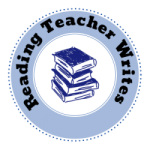To Lunch…and Beyond! Reflections from the All Write Institute — #4
The lunch session took me by surprise. I didn’t want to miss the session called “From Boring to Enjoying”, but I was hungry, so I ate some wonderful food catered by a local BBQ. After filling up and meeting with some blogging buddies in person (!), I headed off to see teachers from Fort Wayne, IN talk about how they used Notice and Note strategies (Beers/Probst) in their classrooms to make reading come alive. The speakers were wonderful, entertaining, and knowledgeable. I loved hearing how they used journals, Edublogs, and stations to keep students interested in reading. “Tabletop Twitter” sounded engaging — a way to have kids respond to reading or writing — a way to collaborate and also have some fun.
One of my main goals next school year is to get students started with blogging. I have found blogs to be a fulfilling way to spend time with writing, and it’s social, academic, and fun! Students can write stories, poems, reflections, and share their views — all from the comforts of “home” (school classroom). Blogging also allows for differentiated instruction and small group work; I can have students easily save their work without losing papers, etc. as well. If there’s one thing I am learning as a veteran teacher, it’s that technology is available and useful, and I need to work with more technology in my classroom.
After lunch, it was time to talk books! This was my favorite part of the day! Tammy and Mary Helen were also wonderful, animated presenters that shared their favorite books for mini-lessons and read alouds. Although many of the books were geared towards the primary grades, I know for sure I will be using many of them in my middle school classroom next year. Why? Because research (and my own experience) shows that reading aloud to students works. Many higher-level thinking skills are used in reading these books, yet they are easy to read (so students can focus on craft and not so much vocabulary), and teachers don’t have to use more time than a mini-lesson to make teaching points (time management). Plus, these books are engaging! (What administrator isn’t looking for that?)
For example, Pitter Patter by Martha Sullivan, shows different ways to say Hello (kids love “different ways to say…”), has information about the water cycle (meeting the standards), and provides extra activities with interactive apps (centers or at-home extension). I love books that include extras at the end. “For more reading, go to…” This keeps students engaged after the school day is over. Another engaging book is I’m a Shark! by Bob Shea. This incredible author is a favorite in schools, and this book includes connections to life, grammar/spelling reminders, and figurative language (also meeting the standards!). One book I have not used before, but I will this fall, is Dragons Love Tacos by Adam Rubin. I learned about the “Power of 3” many years ago in writing workshop, and the students always love the lesson when I teach them this “magic”. This book has voice, which some students find difficult to write. Also, everyday happenings CAN be stories, which students learn quickly in writing workshop. We work on personal narratives first in our curriculum, and Dragons…can help us, I’m sure!
Sharing books and joy is an amazing way to spend time, not only in the classroom with students, but also during a summer PD institute! I was inspired; as I left the room, the only question I had was, “I wonder how much money we are allowed to spend this year on books?”
 I made it through the first few days of school (teachers are in the buildings while students are remote learning). I’m exhausted! I did manage to gather and re-read picture books for read alouds and mentor texts for this first quarter.
I made it through the first few days of school (teachers are in the buildings while students are remote learning). I’m exhausted! I did manage to gather and re-read picture books for read alouds and mentor texts for this first quarter. One special new book is Nana Akua Goes to School, written by Tricia Elam Walker and April Harrison. Grandparents Day is coming, and Zura wants to bring her Nana Akua to school. Zura is worried that her classmates won’t be able to accept the traditional tribal marks on Nana’s face, but Nana knows how to handle the situation. What happens that day is lovely! (No spoilers!) Read this one and share it with your class as you celebrate Grandparents Day this fall.
One special new book is Nana Akua Goes to School, written by Tricia Elam Walker and April Harrison. Grandparents Day is coming, and Zura wants to bring her Nana Akua to school. Zura is worried that her classmates won’t be able to accept the traditional tribal marks on Nana’s face, but Nana knows how to handle the situation. What happens that day is lovely! (No spoilers!) Read this one and share it with your class as you celebrate Grandparents Day this fall.


You must be logged in to post a comment.